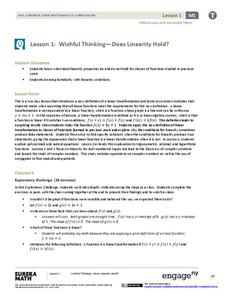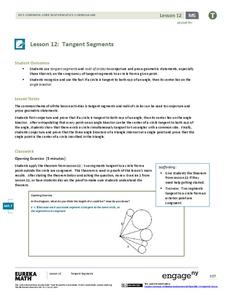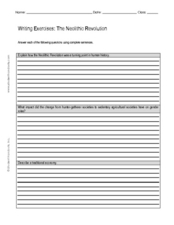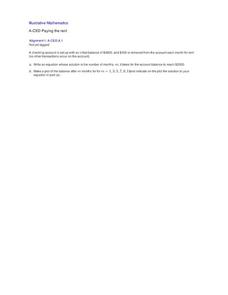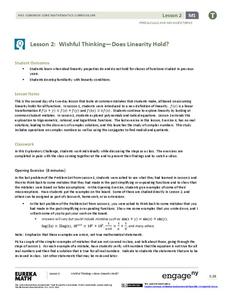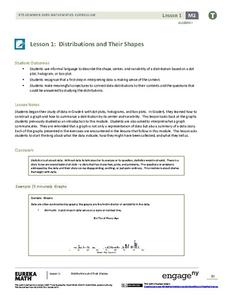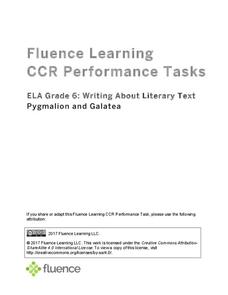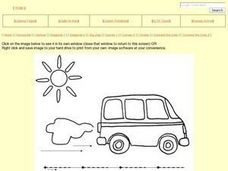Macmillan Education
Positive and Creative Thinking
Positive thinking can be powerful. The exercises on these worksheets will encourage class members to be creative, resourceful, and optimistic.
EngageNY
Wishful Thinking—Does Linearity Hold? (Part 1)
Not all linear functions are linear transformations — show your class the difference. The first lesson in a unit on linear transformations and complex numbers that spans 32 segments introduces the concept of linear transformations and...
EngageNY
An Exercise in Creating a Scale Drawing
Design your dream classroom. The lesson plan contains an exercise to have teams create a scale drawing of their dream classroom. Pairs take the measurements of their classroom and furniture and create a scale factor for them. To finish...
EngageNY
Tangent Segments
What's so special about tangents? Learners first explore how if a circle is tangent to both rays of an angle, then its center is on the angle bisector. They then complete a set of exercises designed to explore further properties and...
K12 Reader
Working with Adverbs
Encourage critical thinking with a grammar exercise that focuses on adverbs and adverbial phrases. Kids read the first parts of 16 sentences, then decide which question to answer (how, how much, where, or when) based on the context, and...
Curated OER
Writing Exercise: The Neolithic Revolution
Provide a format for your historians to explore the Neolithic Revolution using this writing exercise. Three display questions prompt scholars to reflect on how the revolution was a turning point in human history, its impact on gender...
K12 Reader
What Is a Simile?
As fun as a barrel of monkeys, this figurative language worksheet will engage your students in learning to write similes. Asking them to first think of adjectives describing the six nouns listed on the page, this exercise has...
Illustrative Mathematics
Red and Blue Tiles
Here, second graders are tasked to find the patterns that have an even number of tiles. They are asked to think about why these patterns are even or odd and explain how they know.
Illustrative Mathematics
Paying the Rent
Learning how a bank account works is a useful tool. The exercise in the resource is to deduct rent from a checking account and create an equation from a description. Participants then graph the balance of the bank account versus months...
EngageNY
Wishful Thinking—Does Linearity Hold? (Part 2)
Trying to find a linear transformation is like finding a needle in a haystack. The second lesson in the series of 32 continues to explore the concept of linearity started in the first lesson. The class explores trigonometric, rational,...
EngageNY
Distributions and Their Shapes
What can we find out about the data from the way it is shaped? Looking at displays that are familiar from previous grades, the class forms meaningful conjectures based upon the context of the data. The introductory lesson to...
EngageNY
Interpreting the Standard Deviation
Does standard deviation work for non-symmetrical distributions, and what does it mean? Through the use of examples, high schoolers determine the standard deviation of a variety of distributions and interpret its...
EngageNY
Ratios of Fractions and Their Unit Rates 2
Remodeling projects require more than just a good design — they involve complex fractions, too. To determine whether a tiling project will fit within a given budget pupils calculate the square footage to determine the number of...
Curated OER
St. Patrick’s Day
Combine math, creative writing, and leprechauns in a fun St. Patrick's Day activity! Using a bag of gold coins and marshmallows, kids write a math story about a leprechaun that includes a multi-step equation to solve.
EngageNY
Informal Proof of AA Criterion for Similarity
What does it take to show two triangles are similar? The 11th segment in a series of 16 introduces the AA Criterion for Similarity. A discussion provides an informal proof of the theorem. Exercises and problems require scholars to apply...
Curated OER
Trite Expressions Worksheet 1
In this grammar worksheet, students read twenty sentences to find the trite expression in each one and then think of a creative way to rephrase it.
Fluence Learning
Writing About Literary Text: Pygmalion and Galatea
Is it crazy to fall in love with your own work, or is that the purest love of all? Compare two renditions of the classic Greek myth Pygmalion and Galatea with a literary analysis exercise. After students compare the similarities and...
Curated OER
Sentence Completion 13: High-Intermediate Level
Foreshadow, recant, impulsive are a few of the words your pupils must know to correctly respond to the eight problems on a sentence completion activity. The detailed answer key provides insight into the logic and strategies learners can...
Curated OER
h and m
Make printing practice fun as scholars take on lowercase letters h and m in an artistic way. They connect the dots to trace the letters before copying them in the space provided. There is a scene they complete by tracing sets...
Curated OER
Poetry Appreciation – "The Raven"
Introduce your class to "The Raven" by Edgar Allan Poe with this series of activities, exercises, and worksheets. Class members examine an image, analyze a movie trailer, read a prose version of the poem, look up vocabulary, and pick out...
Curated OER
Tracing Exercise
In this tracing instructional activity, students prepare to learn to print by tracing 20 straight dotted lines from left to right. Students then color a picture of a bus.
Drexel University
Learning Roomba Module 4: Sensors and Actuators
Introduce your classes to sensors and actuators in robots — specifically to the Roomba. Pupils develop programs that make Roomba utilize its different sensors.
Creative Chemistry
Use of Common Metals
In this metals learning exercise, learners read about the different properties of aluminum, copper, and iron and determine why these metals are used the way they are. The exercise has five short answer questions.
Creative Chemistry
The Blast Furnace
In this blast furnace learning exercise, learners are given a diagram with six arrows that they label, three parts, and any other detailed information. They use their textbook as a reference and cut out the labeled diagram when finished.

